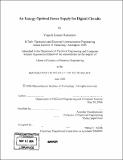An energy optimal power supply for digital circuits
Author(s)
Ramadass, Yogesh Kumar
DownloadFull printable version (5.831Mb)
Other Contributors
Massachusetts Institute of Technology. Dept. of Electrical Engineering and Computer Science.
Advisor
Anantha Chandrakasan.
Terms of use
Metadata
Show full item recordAbstract
The energy efficiency of digital circuits continues to be a major factor in determining the size and weight of battery-operated electronics. Integration of more functionality in a single system has made battery longevity a major problem. Operating circuits at their minimum energy operating voltage (MEP) has been proposed as a solution for energy critical applications where performance is not a key constraint. This thesis explores the sensitivity of the MEP to operating conditions and motivates the need for continuous minimum energy tracking based on the energy savings possible. A circuit that can dynamically track the MEP of a digital circuit with varying load conditions and temperature is presented. A low power, voltage scalable DC-DC converter is also embedded within the chip. The proposed minimum energy tracking algorithm uses a novel approach to sense the energy consumed per operation. The energy sensing circuitry does not use high-resolution Analog-to-Digital converters or high gain amplifiers. The energy estimate is used in a slope tracking algorithm to track the minimum energy operating voltage. The minimum energy tracking loop along with a low-voltage DC-DC converter and test circuitry were fabricated in a 65nm CMOS process. (cont.) The circuits are powered from an external 1.2V supply. The digital test circuitry was capable of operation at voltages as low as 0.25V. The tracking of the minimum energy operating voltage with change in workload and temperature was observed. The DC-DC converter was able to deliver load voltages between 0.25V and 0.7V with an efficiency > 78% at load power levels of the order of 1 0.1W and above.
Description
Thesis (S.M.)--Massachusetts Institute of Technology, Dept. of Electrical Engineering and Computer Science, 2006. Includes bibliographical references (p. 96-98).
Date issued
2006Department
Massachusetts Institute of Technology. Department of Electrical Engineering and Computer SciencePublisher
Massachusetts Institute of Technology
Keywords
Electrical Engineering and Computer Science.